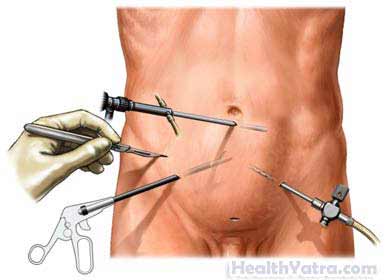تعريف
Laparoscopy is a type of surgery done through several small incisions in the abdomen. Small tools and a laparoscope (tiny camera) are placed through the incisions to allow the surgeon to see inside the belly and perform surgical tasks. This type of surgery is very popular, as it usually shortens recovery time. It also leaves only very small scars in most cases.

أسباب هذا الإجراء
Many types of surgery can now be done with a laparoscope. Some examples include:
- Hernia repair
- Biopsy of abdominal organs
- Appendectomy
- Colectomy
- Gallbladder or gallstone removal
- Tubal ligation
- Ectopic pregnancy surgery
- استئصال الرحم
- Fibroid tumor removal
- Adrenal gland removal
- استئصال الطحال
- Lysis of adhesions in abdomen
It can also be done to help make a diagnosis.
المضاعفات المحتملة
Complications are rare, but no procedure is completely free of risk. If you are planning to have a laparoscopy, your سيقوم الطبيب بمراجعة القائمة من المضاعفات المحتملة، والتي قد تشمل:
- العدوى
- نزيف
- Damage to blood vessels or organs
- Problems related to anesthesia
- The need for open surgery rather than laparoscopic surgery
تشمل العوامل التي قد تزيد من خطر حدوث مضاعفات ما يلي:
- التدخين
- السمنة
- Heart or lung condition
- جراحة سابقة في البطن
- مرض السكري
ما يمكن توقعه
قبل الإجراء
Depending on the reason for your surgery, your doctor may do the following:
- Physical exam and review of medicines
- Blood tests (such as, pregnancy test, liver function, electrolyte status)
- Urinalysis to detect urinary tract infection and diabetes
- Ultrasound—a test that uses sound waves to visualize the inside of the body
- CT scan—a type of x-ray that uses a computer to make pictures of the inside of the body
- فحص التصوير بالرنين المغناطيسي – اختبار يستخدم الموجات المغناطيسية لالتقاط صور لداخل الجسم
في الأيام التي تسبق الإجراء الخاص بك:
- Depending on the نوع الجراحة, you may need to take a laxative or use an enema.
- رتب لتوصيلة إلى المنزل.
- The night before, eat a light meal. Unless told otherwise by your doctor, do not eat or drink anything after midnight.
Talk to your doctor about the medicines you are taking. Up to one week before the procedure, you may be asked to stop taking some medicines such as:
- الأسبرين أو غيره من العقاقير المضادة للالتهابات
- سيولة الدم, مثل كلوبيدوجريل (بلافيكس) أو الوارفارين (الكومادين)
التخدير
Most commonly, you will have general anesthesia—You will be asleep.
وصف الإجراء
After you are asleep and do not feel any pain, a needle will be inserted to inject carbon dioxide into your abdomen. The gas will make your abdomen expand. This will make it easier to see the organs. The laparoscope will then be inserted through a small hole that is cut in the skin. The laparoscope lights, magnifies, and projects an image onto a video screen. The area will then be inspected.
If necessary, several other incisions will be made in the abdomen. Tiny tools will be inserted to take biopsies or do surgery. The incisions will be closed with stitches or clips.
كم من الوقت سيستغرق ؟
This varies greatly depending on the procedure
هل ستسبب الالم؟
Anesthesia will prevent pain during the procedure. You may have soreness for a يومان during recovery. Ask your doctor about pain medicine to help manage pain. You may also feel bloated or have pain in your shoulder from the gas. This can last up to three days.
رعاية ما بعد العملية
Once home, follow your doctor’s instructions, which may include:
- Remove the dressing the morning after surgery.
- تجنب رفع الأشياء الثقيلة.
- Do not drink carbonated beverages for two days.
Ask your doctor about when it is safe to shower, bathe, or soak in water. You should be able to go back to regular activities in about one week. If the procedure was done to help diagnose a condition, your doctor will suggest خيارات العلاج. Biopsy results may take up to a week to come back.
استدعاء الطبيب
After arriving home, contact your doctor if any of the following occur:
- علامات الإصابة, بما في ذلك حمى وقشعريرة
- احمرار أو تورم أو ألم متزايد أو نزيف مفرط أو إفرازات من موقع الشق
- Nausea and/or vomiting that you cannot control with the medications you were given after surgery, or which persist for more than two days after discharge from the hospital
- ألم لا يمكنك السيطرة عليه بالأدوية التي أعطيت لك
- Headache, muscle aches, feeling faint or dizzy
- ألم أو حرقة أو إلحاح أو كثرة التبول أو نزيف مستمر في البول
- Difficulty urinating or having a bowel movement
- سعال أو ضيق في التنفس أو ألم في الصدر
في حالة الطوارئ ، اتصل على المساعدة الطبية على الفور.
